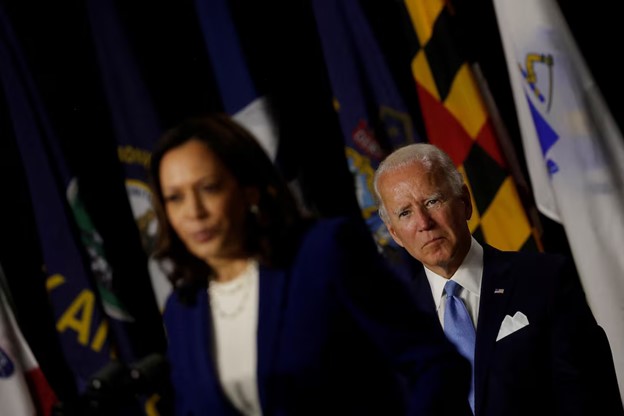REHOBOTH BEACH, Delaware (Reuters) – U.S. President Joe Biden dropped his faltering reelection bid on Sunday, amid intensifying opposition within his own Democratic Party, and endorsed Vice President Kamala Harris to replace him as the party’s candidate against Republican Donald Trump.
Biden, 81, in a post on X, said he will remain in his role as president and commander-in-chief until his term ends in January 2025 and will address the nation this week. He has not been seen in public since testing positive for COVID-19 last week and isolating at his home in Rehoboth Beach, Delaware.
“While it has been my intention to seek reelection, I believe it is in the best interest of my party and the country for me to stand down and to focus solely on fulfilling my duties as President for the remainder of my term,” Biden wrote.
Democratic National Committee Chair Jaime Harrison said the American people will hear from the party on next steps and the path forward for the nomination process soon. It was the first time in more than a half-century that an incumbent U.S. president gave up his party’s nomination.
Biden’s campaign had been on the ropes since a halting June 27 debate against former President Trump, 78, in which the incumbent at times struggled to finish his thoughts.
Opposition from within his party gained steam over the past week with 36 congressional Democrats – more than one in eight – publicly calling on him to end his campaign.
Lawmakers said they feared he could cost them not only the White House but also the chance to control either chamber of Congress next year, which would leave Democrats with no meaningful grasp on power in Washington.
That stood in sharp contrast to what played out in the Republican Party last week, when members united around Trump and his running mate U.S. Senator J.D. Vance, 39.
Harris, 59, would become the first Black woman to run at the top of a major-party ticket in the country’s history.
Trump told CNN on Sunday that he believed Harris would be easier to defeat.
Biden had a last-minute change of heart, said a source familiar with the matter. The president told allies that as of Saturday night he planned to stay in the race before changing his mind on Sunday afternoon.
“Last night the message was proceed with everything, full speed ahead,” the source told Reuters, speaking on condition of anonymity. “At around 1:45 p.m. today: the president told his senior team that he had changed his mind.”
Biden announced his decision on social media within minutes.
It was unclear whether other senior Democrats would challenge Harris for the party’s nomination – she was widely seen as the pick for many party officials – or whether the party itself would choose to open the field for nominations.
Public opinion polling shows that Harris performs no worse than Biden against Trump.
In a hypothetical head-to-head matchup, Harris and Trump were tied with 44% support each in a July 15-16 Reuters/Ipsos poll conducted immediately after the July 13 assassination attempt on Trump. Trump led Biden 43% to 41% in that same poll, though the 2 percentage point difference was not meaningful considering the poll’s 3-point margin of error.
Congressional Republicans argued that Biden should resign the office immediately, which would turn the White House over to Harris and put House of Representatives Speaker Mike Johnson, a Republican, next in line in succession.
“If he’s incapable of running for president, how is he capable of governing right now? I mean, there is five months left in this administration. It’s a real concern, and it’s a danger to the country,” Johnson told CNN on Sunday before Biden’s announcement.
Johnson in a separate interview on ABC signaled that Republicans would likely try to mount legal challenges to Democrats’ move to replace Biden on the ballot.
Biden’s announcement follows a wave of public and private pressure from Democratic lawmakers and party officials to quit the race after his shockingly poor debate.
His troubles took the public spotlight away from Trump’s performance, in which he made a string of false statements, and trained it instead on questions surrounding Biden’s fitness for another four-year term.
His gaffes at a NATO summit – invoking Russian President Vladimir Putin’s name when he meant Ukrainian President Volodymyr Zelenskiy and calling Harris “Vice President Trump” -further stoked anxieties.
Biden’s historic move – the first sitting president to give up his party’s nomination for reelection since President Lyndon B. Johnson during the Vietnam War in March 1968 – leaves his replacement with less than four months to wage a campaign.
If Harris emerges as the nominee, the move would represent an unprecedented gamble by the Democratic Party: its first Black and Asian American woman to run for the White House in a country that has elected one Black president and never a woman president in more than two centuries.
Biden was the oldest U.S. president ever elected when he beat Trump in 2020. During that campaign, Biden described himself as a bridge to the next generation of Democratic leaders. Some interpreted that to mean he would serve one term, a transitional figure who beat Trump and brought his party back to power.
But he set his sights on a second term in the belief that he was the only Democrat who could beat Trump again amid questions about Harris’s experience and popularity. In recent times, though, his advanced age began to show through more. His gait became stilted and his childhood stutter occasionally returned.

